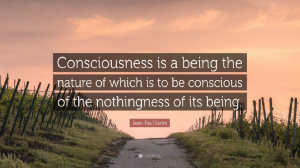
Jean-Paul Sartre
“Being and Nothingness: An Essay on Phenomenological Ontology” is a 1943 book by the philosopher Jean-Paul Sartre. In the book, Sartre develops a philosophical account in support of his existentialism, dealing with topics such as consciousness, perception, social philosophy, self-deception, the existence of “nothingness”, psychoanalysis, and the question of free will.
Jean-Paul Sartre
Being and Nothingness is regarded as both the most important non-fiction expression of Sartre’s existentialism and his most influential philosophical work, original despite its debt to Heidegger. Many have praised the book’s central notion that “existence precedes essence”, its introduction of the concept of bad faith, and its exploration of “nothingness”, as well as its novel contributions to the philosophy of sex.
Being and Nothingness is considered Sartre’s most important philosophical work, and the most important non-fiction expression of his existentialism. Christian existentialist Gabriel Marcel wrote that it was of “incontestable” importance and ranked among the most important contributions made to general philosophy. While Marcel noted the influence of Heidegger on “the form at least” of Being and Nothingness, he also observed that Sartre diverged from the views expressed by Heidegger in Being and Time (1927) in important ways, and that Sartre’s contributions were original.
Jean-Paul Sartre explored the problems and joys of being fundamentally free. Existentialism, the belief system with which he is associated, considers the anguish of freedom.
“Jean-Paul Sartre was born in 1905. His father, a navy captain, died when he was a baby – and he grew up extremely close to his mother until she remarried, much to his regret, when he was twelve. Sartre spent most of his life in Paris, where he often went to cafes on the Left Bank and sat on benches in the Jardin du Luxembourg. He had a strabismus, a wandering eye, and wore distinctive, heavy glasses. He was awarded the 1964 Nobel Prize for literature, but refused it on the grounds that the award was capitalist and bourgeois. He was very short (five feet three inches) and frequently described himself as ugly. He wore his hair vigorously brushed back. When he died in 1980 (aged 74), 50,000 people accompanied his coffin through the streets of Paris…”
